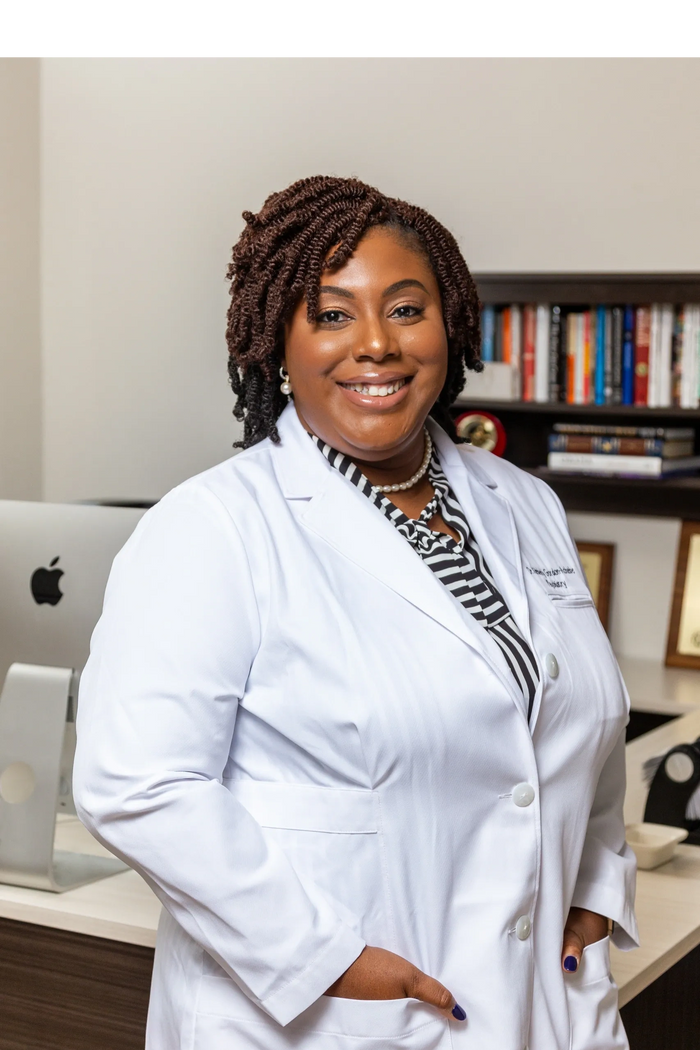

Hello, I'm Dr. Kim Gordon (she, her, hers)
Hello, I'm Dr. Kimberly Gordon-Achebe (she, her, hers). Mindset & Health Equity Coach | Double Board-Certified Adult, Child & Adolescent Psychiatrist | Empowering Black, Indigenous, and Women of Color (BIWOC) leaders to redefine success and create a healthier, more fulfilling life – even if balance has always felt out of reach.
It's time
Hello, I'm Dr. Kimberly Gordon-Achebe (she, her, hers). Mindset & Health Equity Coach | Double Board-Certified Adult, Child & Adolescent Psychiatrist | Empowering Black, Indigenous, and Women of Color (BIWOC) leaders to redefine success and create a healthier, more fulfilling life – even if balance has always felt out of reach.
It's time to make your life and career sustain you.
You didn't become a leader to feel burned out and overwhelmed.
You didn't become a leader to sacrifice your well-being for the sake of your career.
You didn't become a leader to struggle with work-life balance and feel like you're constantly running on empty.
**YOU BECAME A LEADER TO MAKE A DIFFERENCE**
**AND TO THRIVE WHILE DOING IT **
But things are getting in the way.
You feel exhausted from the constant demands and pressures of your role.
You feel frustrated that you can't seem to communicate effectively with your team and stakeholders.
You feel disappointed that your life outside of work is suffering because of your dedication to your career.
You feel like you've lost sight of your goals and purpose amidst the daily grind.
You're starting to question if you have what it takes to be a successful leader and if you'll ever find the balance and fulfillment you crave.
I know EXACTLY how you feel.
I've been there too.
And I know how to help.
I know exactly how to guide you in developing the skills and mindset you need to prevent burnout, excel in communication, find balance, prioritize rest, and achieve your goals.
Because in order for you to truly thrive as a leader, you need to start making some changes.
You need to think differently about success and respond differently to the challenges you face.
You need to master the skill of
**LEADING WITH RESILIENCE AND EMPATHY.**
I am the coach to help you get there.
Through my "Burnout to Breakthrough" masterclass, you'll learn practical strategies for overcoming burnout, building resilience, and cultivating inclusive leadership skills to enhance your performance and well-being. You'll gain new insights into your unique strengths, challenges, and opportunities as a leader, and develop the tools you need to communicate effectively, set boundaries, and prioritize self-care.
Together, we'll redefine what success looks like for you and create a roadmap for achieving your goals while maintaining balance and joy in your life.
You deserve to thrive as a leader.
Let's make it happen.
Black Women & Mental Health
@Black Psychiatry Presents
We dedicated this to all the excellent Black Women we've lost. The Great Cicely Tyson transitioned during our recording and we are forever indebted to her grace. We dedicate this to Dr. Pat Newton and the wonderful women who raised and guided our panelists. Join us as we discuss a path to liberation. Our expert panelists and you, the community, will talk about protecting Black women's mental health. How do we cope and thrive?
Back to School Town Hall
Join us for a live special edition back-to-school night discussing caring for children during the pandemic who are returning to school this fall. Our expert psychiatrists, teachers, and social workers will discuss how to help our children who are returning to unique settings.
Our Company

BHETC
BHETC (Bringing Health Equity to Communities) is a consulting firm founded and directed by Dr. Kim Gordon to support health equity initiatives for women, children, adolescents and their families through collaboration with communities, systems, organizations and naturally occurring social networks.
Success is not final, failure is not fatal: It is the courage to continue that counts.
Winston Churchill

Solutions oriented, experienced, and professional
Copyright © 2024 Drkimanswers - All Rights Reserved.
This website uses cookies.
We use cookies to analyze website traffic and optimize your website experience. By accepting our use of cookies, your data will be aggregated with all other user data.
